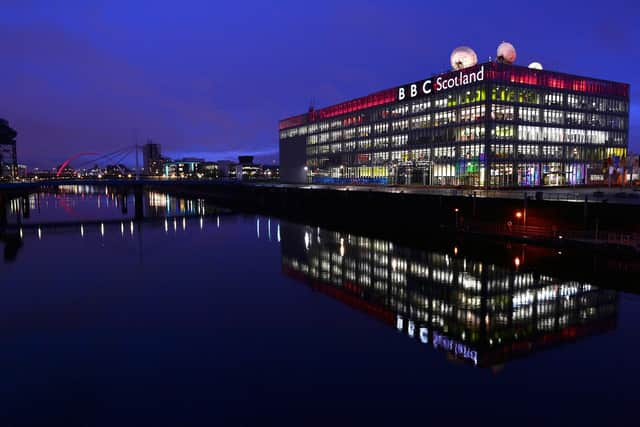BBC: More arts and culture radio shows set to be made in Scotland under BBC shake-up
More BBC radio programmes and podcasts are to be made in Glasgow and Edinburgh in future, the broadcaster has revealed.
Multi-million pound plans for a new production hub in Scotland and Northern Ireland will be focused on arts and culture shows.
Advertisement
Hide AdAdvertisement
Hide AdNetwork programmes like Front Row, Loose Ends and World Book Club will be made in Scotland in future as part of the broadcaster's drive to move shows and teams out of London.


The move, described as a “multi-million investment,” is expected to significantly increase the volume of shows made for BBC Radio, BBC Sounds and the BBC World Service north of the border.
The BBC said it would ensure an increase in the “range of voices” heard on shows and “better reflect” the entire country.
BBC Audio, the broadcaster’s in-house production team, already has existing hubs in London, Birmingham, Cardiff, Bristol and Salford.
A new head of production will lead the new production unit, which will have around 30 roles and is expected to be up and running in April. The number of new jobs will depend on whether existing staff choose to relocate to Scotland or Northern Ireland.


BBC director-general Tim Davie has pledged to move power and decision-making across the UK as part of a commitment to “better reflect, represent, and serve all parts of the country.” Key pledges include ensuring that 50 per cent of network radio and music spend will be outside London by 2027-28.
An official announcement from the BBC states: “The new Scotland and Northern Ireland audio unit will produce content across various
Advertisement
Hide AdAdvertisement
Hide Adgenres, focusing on arts and culture, drama and readings, and classical music.
“In addition to existing network radio content that’s made in Scotland and Northern Ireland, Scotland will see the arrival of the BBC World Service’s World Book Club and Radio 3’s Jazz Record Requests, alongside 50 annual episodes of Front Row, Radio 4’s flagship arts programme, and 12 episodes of Loose Ends.
"Scotland will also become the home of BBC Audio’s production of Radio 4’s books and readings programming.
"BBC Audio will now have vibrant network radio production hubs in all the four nations, bringing more investment into different parts of the UK, enhancing portrayal and supporting the nations’ audio sectors.
"The new unit gives the teams across Scotland and Northern Ireland opportunities for collaboration, career progression and to work on a broader range of output.”
BBC Audio controller Graham Ellis said: “As part of our plans to create vibrant BBC Audio hubs in all the devolved nations, we can bring more investment to Scotland and Northern Ireland.
“We will be increasing the volume of network radio content that will be produced in Scotland and Northern Ireland, and I look forward to working with our colleagues to make the new unit a success.
Advertisement
Hide AdAdvertisement
Hide Ad"We all have proud and distinct traditions of creative programme making, but by coming together we complement and strengthen each other.”
BBC Scotland director Steve Carson said: “The creation of this unit recognises the importance of representation and portrayal and the importance of developing new talent. I’m excited about the opportunities this could create for our teams.”
Mohit Bakaya, director of speech audio at the BBC said: “This will help us to increase the range of voices we feature on air and the creative ideas we pursue in order to improve the quality of our programming and better reflect the country we live in."
Comments
Want to join the conversation? Please or to comment on this article.
